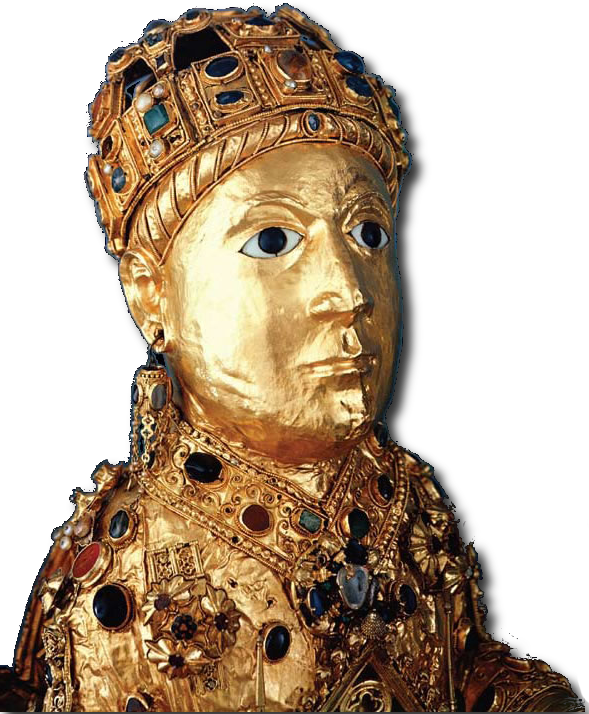 |
MedievalEuropeOnline
the web home of Medieval Europe: A
Short History
|
Chapter 3: Neighbors: Byzantium and Islam, c. 500-1000
ONLINE RESOURCES:
Constantinople
(and the Eastern Emperors)
Hadith and the Prophet Muhammad
TEST YOURSELF: Have you read Chapter 3 adequately? Test yourself here.
MAPS: Want to download a map from this chapter 3? Click here
TIMELINES: Want to download a timeline from chapter 3? Click here
CITATIONS: Want to find the source of a quote used in chapter 3? Click here
HISTORICAL STUDIES:
David Levering Lewis, God’s Crucible: Islam and the Making of
Europe, 570-1215 (2008). A new and readable synthesis. For a
scholarly collection of essays on trade, technology, literature, and
culture, see Dionisius A. Agius and Richard Hitchcock, eds., The
Arab Influence in Medieval Europe (1994).
Michael Angold, Byzantium: The Bridge from Antiquity to
the Middle Ages (2001). A new summary by a distinguished
scholar. See also John Haldon, Byzantium: A History (2000),
and Judith Herrin, Byzantium: The Surprising Life of a Medieval
Empire (2010).
Guglielmo Cavallo, ed., The Byzantines (1997). Up-to-date essays on various aspects of Byzantine history. See also Elizabeth Jeffreys, ed., The Oxford Handbook of Byzantine Studies (2009).
Norman Daniel, The Arabs and Medieval Europe (2nd edition,
1979). A very useful survey. For a short, readable survey, try Richard
Fletcher, The Cross and the Crescent: Christianity and Islam from
Muhammad to the Reformation (2003).
Richard Fletcher, Moorish Spain (1992). A highly readable account running to the early seventeenth century. See also Bernard F. Reilly, The Medieval Spains (1993); Roger Collins, The Arab Conquest of Spain, 710–797 (2nd edition, 1994); and Hugh Kennedy, Muslim Spain and Portugal: A Political HIstory of al-Andalus (1996).
Lynda Garland, Byzantine Empresses: Women and Power in
Byzantium, A.D. 527–1204 (1999). Offers thorough studies of
individual empresses. See also the texts in Alice-Mary Talbot, ed., Holy
Women of Byzantium: The Saints’ Lives in English Translation
(1996).
Albert H. Hourani, A History of the Arab Peoples (rev.
ed., 2002). Includes an outstanding account of medieval Islam. See
also Hugh Kennedy, The Prophet and the Age of the Caliphates (2nd
edition, 2003).
Nikki R. Keddie and Beth Baron, eds., Women in Middle Eastern
History (1991). A useful collection of diverse
interpretations, fully half related to medieval subjects.
John Meyendorff, Byzantine Theology: Historical Trends and
Doctrinal Themes (2nd ed., 1979). A clear and concise survey
of a complex subject.
Warren Treadgold, A History of the Byzantine State and Society (1997). See also Speros Vryonis, Byzantium and Europe (1967) for a short, well-illustrated interpretive survey.
PRIMARY SOURCES IN PRINT:
Olivia Remie Constable, ed., Medieval Iberia: Readings from
Christian, Muslim, and Jewish Sources (1997). An eclectic and
useful collection, with substantial sections on Muslim conquest and
settlement.
Bernard Lewis, ed., Islam, from the Prophet Muhammad to the
Capture of Constantinople, 2 vols. (1974). See also William H.
McNeill and Marilyn Robinson. Waldman, eds., The Islamic World (1973).
Michael Anthony Sells, Approaching the Qur’an: The Early Revelations (1999). Provides explanations, translations, and recitations (on a CD) of 35 passages from the Quran.
These listings are works-in-progress. They are highly selective and aimed at the practical needs of students and teachers. If you have suggestions, please send them to Judith Bennett.